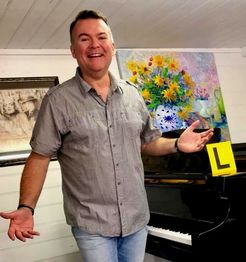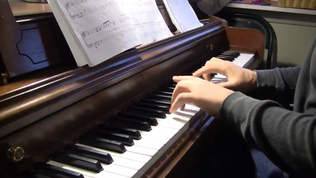
Informal activities with music should start soon after birth, followed by more systematic classes around age three, and lessons with the goal of learning the instrument should start between six and nine. In fact, studies at the University of California suggest that taking music lessons at age 3 can increase your child's brainpower. However, many piano teachers prefer that children wait until they are 5, when their hands are bigger and they're more ready to sit still and concentrate.
In my experience (over 35 years of teaching), I have found the best time to start is when the child can count to 20, knows the alphabet (A-Z) and is going up to a piano or keyboard and trying to play simple songs. The age can vary as every child is different and may or may not have had exposure to music around the house. Generally I start students from the age of 6 years old.
Starting out with just one term of lessons which is usually one lesson a week for 10 weeks. This will give the child exposure to music and formal lessons. It will also start your child working with music to practice for the following week and also some written homework as well.
A few signs to also look for in your child...
1. They can focus on a book or task for 5 to 10 minutes. Being able to focus on the lesson is important. Most preschool piano teachers will include a variety of songs and activities during the lesson, but there are periods when focus is needed.
2. They accept guidance and instruction. Being open to learning is key. For example, they allow you to guide them when they assist with cooking or other household tasks. Being able to recognize most if not all letters and count to 10 or higher are signs your child is ready for instruction.
3. The child enjoys sitting and playing an acoustic piano or electronic keyboard on their own. Being excited to sit and play is key. You may see your child explores the sounds they can make or pretending to play. Have conversations about music lessons.
4. YOU are committed to setting aside time and energy. Parental knowledge of music is not required but parents need to be available to listen to their child practice. Children rarely practice on their own or what they need to be practicing. They need reminders and encouragement to do so. Your support is needed.
Remember…
For children ages 3-5, it is important for lessons to focus on developing music concepts (high and low, loud and soft), recognition of patterns, building confidence and developing finger independence.
If you would like to have a chat or more information about this please contact me. It doesn't matter where you are or what instrument you are thinking of starting your child on. I am only too happy to guide you in the right direction.
Paul.
In my experience (over 35 years of teaching), I have found the best time to start is when the child can count to 20, knows the alphabet (A-Z) and is going up to a piano or keyboard and trying to play simple songs. The age can vary as every child is different and may or may not have had exposure to music around the house. Generally I start students from the age of 6 years old.
Starting out with just one term of lessons which is usually one lesson a week for 10 weeks. This will give the child exposure to music and formal lessons. It will also start your child working with music to practice for the following week and also some written homework as well.
A few signs to also look for in your child...
1. They can focus on a book or task for 5 to 10 minutes. Being able to focus on the lesson is important. Most preschool piano teachers will include a variety of songs and activities during the lesson, but there are periods when focus is needed.
2. They accept guidance and instruction. Being open to learning is key. For example, they allow you to guide them when they assist with cooking or other household tasks. Being able to recognize most if not all letters and count to 10 or higher are signs your child is ready for instruction.
3. The child enjoys sitting and playing an acoustic piano or electronic keyboard on their own. Being excited to sit and play is key. You may see your child explores the sounds they can make or pretending to play. Have conversations about music lessons.
4. YOU are committed to setting aside time and energy. Parental knowledge of music is not required but parents need to be available to listen to their child practice. Children rarely practice on their own or what they need to be practicing. They need reminders and encouragement to do so. Your support is needed.
Remember…
For children ages 3-5, it is important for lessons to focus on developing music concepts (high and low, loud and soft), recognition of patterns, building confidence and developing finger independence.
If you would like to have a chat or more information about this please contact me. It doesn't matter where you are or what instrument you are thinking of starting your child on. I am only too happy to guide you in the right direction.
Paul.
Engage. Encourage. Explore. Experience. Enjoy.
Make Music Part of Your Childs Life... Today.
Private Studio Tuition - Group Classes - Online Tuition
Make Music Part of Your Childs Life... Today.
Private Studio Tuition - Group Classes - Online Tuition



